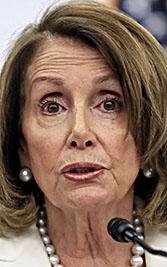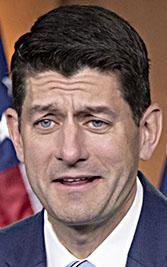WASHINGTON -- To help fix its "failed budget process," Congress should switch from annual to biennial budgeting, House Speaker Paul Ryan told lawmakers Wednesday.
"I think biennial budgeting is the smartest way to go, and I think biennial budgeting has great bipartisan roots," the Wisconsin Republican told the Joint Select Committee on Budget and Appropriations Reform. "It, to me, offers a path to rewriting the process, not just reforming it."
The co-chairmen -- U.S. Reps. Steve Womack, R-Ark., and Nita Lowey, D-N.Y., -- had invited their colleagues to appear before their committee. Two dozen agreed to appear, including Ryan; House Minority Leader Nancy Pelosi; Minority Whip Steny Hoyer, D-Md.; U.S. Rep. French Hill, R-Ark.; and U.S. Rep. Bruce Westerman, R-Ark.
Several House and Senate members said the current system results in unwise spending decisions; the national debt is now more than $21 trillion.
Recent tax cuts, championed by Republicans, have accelerated deficit spending, adding $1.8 trillion to the debt over the next decade, according to a recent Congressional Budget Office report.
Under the 1974 Congressional Budget Act, lawmakers are supposed to pass a dozen separate spending bills by Oct. 1, the start of the federal fiscal year.
But they haven't completed their task by the deadline in more than two decades. Some years, they fail to pass any of the 12 -- late or otherwise.
Instead, they pass stopgap "continuing resolutions" -- or CRs -- that tie appropriations to existing spending levels. Designed to be short-term fixes, they can be renewed if lawmakers remain at an impasse.
The existing timetable, Ryan said, is simply unrealistic.
"You have a tight timeline, even under the best circumstances. ... Invariably what happens now is the process seizes up and, not long after, the whole thing falls apart. And as the clock ticks down, final decisions are kicked up to leadership," Ryan said.
Congress often ends up passing a big spending package -- known as an omnibus bill -- rather than the dozen smaller appropriations bills.
Ultimately, a handful of congressional leaders produce "a massive bill," which is then sent to the rank and file for an up-or-down vote, Ryan noted.
"That is not a good way to run government. The power is too ... concentrated. It is not how government should work," Ryan said.
By switching to a biennial budgeting process, Congress could tackle six appropriations bills instead of 12 each year, he noted.
Pelosi agreed that the nation's budget is out of control, telling lawmakers, "This fiscal recklessness cannot continue."
But she blamed Republicans for the rapidly growing debt.
"President [Bill] Clinton handed President [George W.] Bush a projected $5.6 trillion, 10-year budget surplus," she said. "That surplus was squandered, again, with massive tax cuts for the rich [and] ... two unpaid wars. The tax cuts and spending sprees exploded the deficit."
Lowey said the culture on Capitol Hill is contributing to budgetary dysfunction.
"In my judgment, the root causes often lie in deep divisions over policy, combined with misplaced priorities, partisanship and polarization," she said.
But she expressed a willingness to search for common ground.
"If we can talk through these issues, hopefully we'll make major changes in the process," she said.
Hill said changes are overdue.
"In the past two decades, Congress's budgetary muscles have atrophied, rarely completing a budget or passing appropriations measures prior to the fiscal year end," the lawmaker from Little Rock said. "The government is run from one dysfunctional CR to another, periodically punctuated by an unaccountable omnibus appropriation that pleases no one."
Westerman said the status quo can't continue.
"Deficit spending is easy. Balancing a budget is hard. It requires tough decisions that many do not wish to make and decisions that will inevitably upset certain individuals," the lawmaker from Hot Springs said. "We simply cannot continue spending beyond our means."
A $1.3 trillion spending bill, known as the Bipartisan Budget Act of 2018, mandated creation of the joint select committee.
The committee has until Nov. 30 to "provide recommendations and legislative language that will significantly reform the budget and appropriations process."
Womack, who had personally encouraged colleagues to testify, found plenty of takers.
"I'm encouraged by the number of people that are speaking because it tells me that there is universal support for change," he said, shortly before the meeting began.
During a break, Womack said he wasn't surprised by what he was hearing.
"Overall, I think there's agreement that the process is broken," the former Rogers mayor said. "Where things get bogged down is, 'How do you fix it?' And that's where this committee will be challenged."
A Section on 06/28/2018


